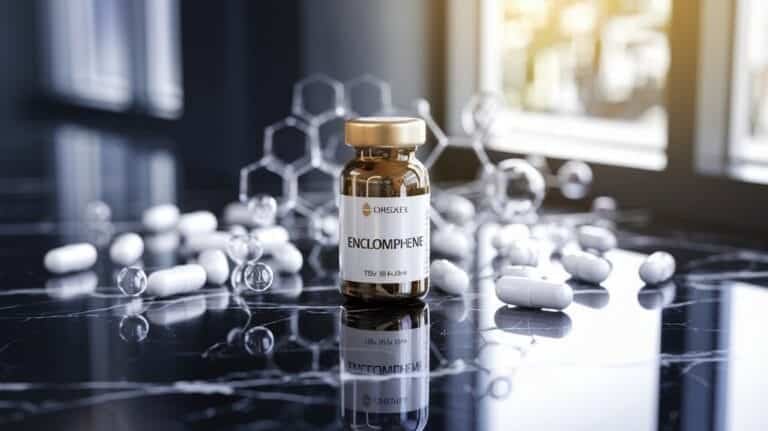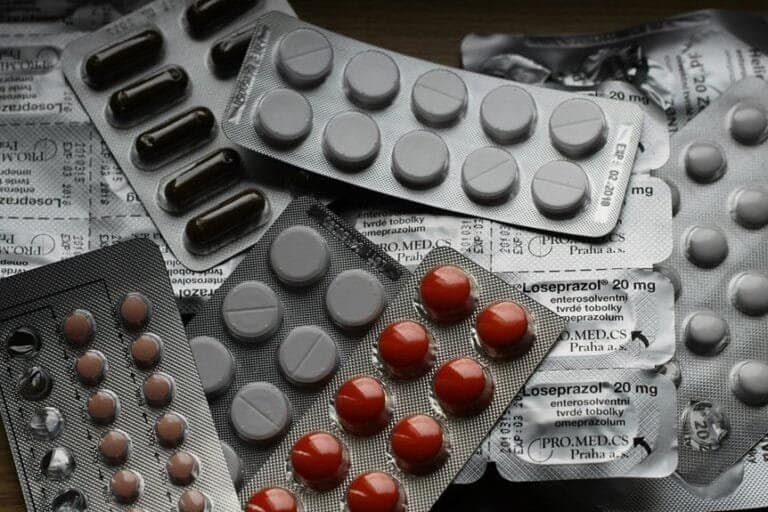Testosterone Replacement Therapy (TRT) offers several remarkable mental health benefits. It can substantially improve your mood, decreasing feelings of anger, irritability, and sadness. You'll likely notice reduced anxiety and stress levels as hormonal balance is restored, promoting better emotional regulation. TRT also boosts your energy, enhancing motivation and physical performance. Your cognitive function may improve too, aiding memory and reasoning. Additionally, you'll experience increased confidence, which can strengthen your relationships and communication skills. With so much to gain, understanding TRT's nuances is essential for making informed decisions about your mental health journey. There's more to uncover about its advantages.
Key Takeaways
- TRT significantly stabilizes mood, with reductions in anger, irritability, and sadness noted after just a few weeks of treatment.
- Improved emotional regulation through TRT leads to decreased anxiety levels and better stress management in men.
- Increased energy levels and motivation from TRT contribute to a more positive outlook on daily activities and overall well-being.
- Cognitive functions, such as spatial memory and reasoning, show enhancement due to improved cerebral blood flow during TRT.
- TRT fosters stronger interpersonal relationships by boosting confidence, improving communication, and enhancing conflict resolution skills.
Improved Mood

When it comes to the mental health benefits of testosterone replacement therapy (TRT), the improvements in mood stand out noticeably. You'll likely experience considerable mood stability as TRT targets negative emotions that often drag you down. Research shows notable decreases in anger (P = 0.0045), irritability (P = 0.0009), and sadness (P = 0.0033). These reductions can help cultivate emotional resilience, allowing you to face daily challenges with a more balanced perspective.
Moreover, TRT boosts positive emotions and increases energy levels, contributing to a revitalized sense of well-being (P = 0.024). You might find yourself feeling more full of pep, friendly (P = 0.0072), and embracing life with newfound zest. Additionally, as TRT restores healthy blood testosterone levels, individuals often notice a profound shift in their emotional landscape.
Clinical studies reveal that men receiving TRT often report a 15% reduction in depressive symptoms within 12 months. Even as early as three to six weeks, you'll likely notice beneficial effects on mood parameters.
With reduced chronic fatigue, you'll not only feel less irritable but also more content in your daily life. Overall, TRT can considerably enhance your mood and emotional stability, fostering a more fulfilling experience as you navigate your world.
Reduced Anxiety

Anxiety can be a debilitating experience, impacting daily life and overall well-being. Testosterone fluctuations can considerably contribute to this issue, as low testosterone levels often impair your brain's ability to manage stress.
Fortunately, Testosterone Replacement Therapy (TRT) can restore hormonal balance, allowing for better emotional regulation and reduced anxiety. In fact, recent studies have indicated that there has been a significant increase in TRT prescribing rates among men experiencing mental health conditions.
Studies show that men undergoing TRT report improvements in anxiety and stress management. By boosting testosterone levels back to a normal range, your brain functions more effectively in regulating mood and coping with stress.
Many men experience fewer episodes of anxiety and panic shortly after starting treatment. These benefits emerge from a more stable hormonal environment, enhancing your capacity to concentrate and alleviating the physical symptoms associated with anxiety, such as muscle tension and increased heart rate.
While TRT isn't a cure-all, it represents a promising approach for men plagued by anxiety linked to testosterone deficits. Regular monitoring and consultation with healthcare providers guarantee you receive the best possible outcomes.
Increased Energy

Energy plays an important role in your daily life, influencing everything from productivity to mood. If you're experiencing fatigue or low motivation, increased testosterone levels from testosterone replacement therapy (TRT) may offer a solution. TRT helps restore energy levels, effectively countering persistent fatigue and enhancing your overall liveliness.
Low testosterone can greatly dampen your motivation, but TRT works to elevate both your energy and your sense of well-being. You'll likely notice improvements soon after starting therapy, allowing you to engage more fully in personal and professional activities. Additionally, the therapy contributes to improved muscle mass, further enhancing your physical performance and stamina.
Enhanced red blood cell production and oxygen delivery further contribute to your improved physical performance, making it easier to maintain an active lifestyle.
Moreover, increased energy and liveliness enhance your ability to tackle daily tasks, leading to a more positive outlook on life. As TRT reduces age-related muscle loss and fatigue, it not only promotes energy restoration but also encourages a proactive approach to health.
You'll find yourself feeling physically stronger and more motivated, empowering you to seize opportunities and forge a fulfilling life. Embrace the benefits of TRT, and watch your energy and enthusiasm flourish.
Improved Cognitive Function

Numerous studies highlight the considerable impact testosterone replacement therapy (TRT) can have on improving cognitive function. One of the key benefits you might experience is enhanced spatial memory, critical for steering your environment and performing daily tasks. TRT elevates blood flow in brain regions important for memory, reasoning, and emotions, such as the midbrain and superior frontal gyrus.
This boost in cerebral perfusion typically manifests after just a few weeks, leading to better performance in cognitive tasks. Moreover, TRT influences neurotransmitter regulation, which is essential for maintaining cognitive health. Additionally, as TRT helps restore hormonal balance, it creates a more favorable environment for overall brain function.
By enhancing synaptic plasticity and activating distributed cortical networks, TRT supports your brain's ability to process information efficiently. As a result, you're likely to find improvements in mental arithmetic, concentration, and memory recall.
Especially for those with mild cognitive impairment or conditions like Alzheimer's, TRT can considerably elevate scores on cognitive assessments. The therapy not only reduces the risk of cognitive decline but also fosters better learning and memory capabilities.
All of these factors contribute to a profound sense of mental clarity and focus, making TRT a valuable option for improving your cognitive function.
Reduced Depression

Recent advancements in understanding testosterone replacement therapy (TRT) have revealed its significant role in alleviating depressive symptoms. Research shows that testosterone therapy can particularly reduce depressive symptoms, especially in men undergoing higher-dosage regimens. Specifically, a thorough meta-analysis found a moderate antidepressant effect in men with clinical mild depression.
Here's a closer look at how TRT impacts depression:
| Population Affected | Response to TRT | Notes |
|---|---|---|
| Men with hypogonadism | Significant improvement | Higher doses yield better results |
| Elderly men | Positive effects | Comparable benefits across ages |
| Men with mild depression | Remarkable symptom reduction | Lower baseline testosterone linked to improvement |
| Subpopulations (e.g., HIV/AIDS) | Positive response | essential for mental well-being |
| Men without pretreatment depression | Reduced symptoms | Clinical value may vary |
Higher doses of testosterone, particularly above 0.5 g/week, enhance positive outcomes. While TRT can effectively combat depressive symptoms, caution is warranted due to potential risks of major depressive disorder. Continuous monitoring and thorough evaluation remain important for those experiencing clinical depression while on testosterone therapy. Furthermore, TRT has been shown to significantly reduce depressive symptoms in patients with mild pretreatment depression.
Enhanced Self-Confidence

Enhanced self-confidence is one of the most notable benefits of testosterone replacement therapy (TRT), reshaping how individuals perceive themselves and engage with the world around them.
As your confidence increases, you're likely to experience improved assertiveness in the workplace, enabling you to pursue new opportunities and tackle challenges head-on. This newfound assertiveness is amplified through effective assertiveness training, enhancing your decision-making skills and overall career performance.
Additionally, with restored testosterone levels, you'll notice an elevation in your leadership qualities. Increased confidence can make you more willing to take on leadership roles, motivated by the drive to improve your social status.
The energy and motivation associated with TRT contribute greatly to your ability to inspire and lead others.
In your personal life, enhanced confidence can lead to better communication with partners, ultimately strengthening your intimate relationships.
Potential Risks and Considerations

While testosterone replacement therapy (TRT) can markedly boost your self-confidence and overall well-being, it's important to be aware of the potential risks and considerations associated with its use. One significant concern is the cardiovascular risks, which may include increased likelihood of blood clots and potential elevations in cholesterol and blood pressure levels.
Regular cardiovascular monitoring is essential for mitigating these risks, especially if you have pre-existing heart conditions.
Another concern is prostate health. TRT can stimulate the growth of prostate cancer, necessitating rigorous prostate screening before and during therapy, particularly if you have elevated PSA levels. You might experience worsening benign prostatic hypertrophy (BPH), leading to urinary difficulties.
Additionally, be mindful of other health risks such as sleep apnea exacerbation, elevated red blood cell counts, and liver issues.
Behavioral and psychiatric changes, including mood swings and increased aggression, should be monitored as well.
Therefore, before starting TRT, it's important to discuss all these potential risks and establish a thorough management plan with your healthcare provider to guarantee you reap the benefits while minimizing adverse effects.
Frequently Asked Questions
How Long Does It Take to See Mental Health Improvements From TRT?
You'll typically see mental wellness improvements from TRT within weeks to months. The TRT timeline shows increased energy, mood stability, and clearer thinking, often becoming more pronounced around three to six months into treatment.
Are There Specific Symptoms of Low Testosterone Linked to Mental Health Issues?
Yes, low testosterone can manifest through mood swings, irritability, anxiety, and depression. This testosterone deficiency greatly impacts mental health, leading to emotional distress and decreased self-worth, making awareness of these symptoms essential for overall well-being.
Can Lifestyle Changes Enhance the Mental Health Benefits of TRT?
Lifestyle modifications like balanced nutrition, regular exercise, and stress management greatly enhance your mental wellness. By adopting these changes, you'll likely experience improved mood, heightened energy, and greater overall well-being alongside TRT.
What Age Group Benefits Most From TRT Regarding Mental Health?
You'll find middle-aged men typically benefit most from testosterone therapy regarding mental health. Age ranges between 40 and 60 often experience significant improvements in mood, cognitive function, and overall emotional well-being with treatment.
Is TRT Effective for Improving Mental Health in Women as Well?
Yes, TRT can effectively enhance mental health in women by restoring hormonal balance. Improved mood, reduced anxiety, and better cognitive function are common TRT effects, helping you achieve emotional stability and overall well-being.
Conclusion
To sum up, testosterone replacement therapy (TRT) can greatly enhance your mental health, evidenced by studies showing that over 40% of men report improvements in mood and reduced anxiety after treatment. While you might experience increased energy and improved cognitive function, it's crucial to weigh these benefits against potential risks. Always consult with a healthcare professional before starting TRT to tailor a plan that best suits your needs and safeguards your overall well-being.






